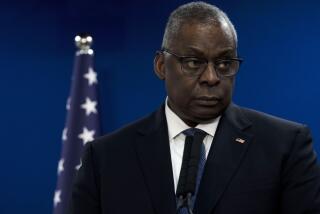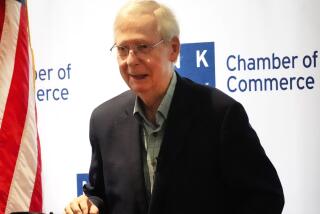Russians’ Confidence Fades in Invisible--but Purportedly Busy--Leader : Health: A hospitalized Yeltsin is wielding his pen, but behind-the-scenes bustle fails to reassure the public.
- Share via
MOSCOW — To hear his aides tell it, President Boris N. Yeltsin has been as active as a volcano behind the cloistered walls of the Kremlin hospital. On Friday, they said, he met with his defense minister, vetoed new parliamentary perquisites and bestowed honors on the nation’s police force.
But despite the reported flurry of activity, there have been no glimpses of the ailing 64-year-old leader since a carefully choreographed videotape was issued by the Kremlin a week ago.
The behind-the-scenes bustle reported around Yeltsin, who has been hospitalized since Oct. 26 with a heart ailment, appears aimed at persuading the outside world and the Russian people not to worry.
Nevertheless, concern has mounted at home and abroad that the president is in worse condition than his entourage is letting on.
Poll results released this week by the Mneniye (Opinion) research firm found that only 11% of more than 1,000 respondents considered Yeltsin in good enough health to fulfill his duties.
Even the once-docile Russian media are showing signs of frustration.
“As before, we have managed to learn nothing useful even outside the gates of the Central Clinical Hospital,” a snow-caked reporter for Independent Television complained, alluding to the days when Soviet leaders slipped away in seclusion.
*
The suggestions of eroding public confidence among Russians coincide with U.S. offers to help with Yeltsin’s treatment in any way.
This includes sending coronary specialists, medical equipment or drugs to Moscow, a White House official said.
“As soon as we learned that Yeltsin had become ill, we told them that the full resources of the American medical community were at their disposal,” a White House aide said.
But Moscow has not requested any assistance and none has been provided, she said.
Doctors with the CIA reportedly fear that Yeltsin could suffer a fatal heart attack unless he is given sophisticated treatment.
But Kremlin aides insist that there is nothing wanting in Russian medical services available to the leader. And presidential spokesman Sergei K. Medvedev was brusque in his statement to Russian television that the White House offer had been rejected.
“We have informed Bill Clinton that Boris Nikolayevich [Yeltsin] does not need any special medical assistance,” Medvedev stated. “We have in Russia, and especially in the Central Clinical Hospital, all necessary equipment and specialists.”
Medvedev’s defensive tone has also been expressed by other Yeltsin aides, intensifying suspicions in diplomatic circles that the severity of the leader’s condition is being deliberately understated to ward off any transfer of power to Prime Minister Viktor S. Chernomyrdin.
Chernomyrdin has been allowed to see Yeltsin only once since the president was hospitalized, during the videotaped meeting Nov. 3, but nonetheless he sought to assure the public a full week later that Yeltsin’s condition is improving.
“The president will soon be better,” Chernomyrdin told journalists Friday, basing his conclusion on phone calls with Yeltsin.
After an hourlong visit with Yeltsin on Friday, Defense Minister Pavel S. Grachev told reporters that the duration of their talks should be evidence enough of the president’s health.
*
Russian media also said that Yeltsin vetoed a bill expanding pensions and medical benefits for deputies of the Duma and that he issued a decree honoring Interior Ministry forces on the Militia Day holiday.
Only still photos from the week-old videotape have accompanied the television reports, however, encouraging speculation that Yeltsin has improved little since appearing breathless and fatigued in that footage.
Times staff writer John M. Broder in Washington contributed to this report.
More to Read
Sign up for Essential California
The most important California stories and recommendations in your inbox every morning.
You may occasionally receive promotional content from the Los Angeles Times.














